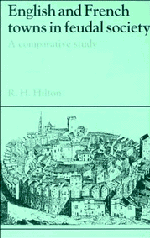3 - Urban social structures
Published online by Cambridge University Press: 03 May 2011
Summary
It is often assumed that conflicts in the middle ages between feudal lords or institutions, such as monasteries, and the urban bourgeoisie arose from a clash of incompatible class interests, anticipating later conflicts leading to ‘bourgeois revolutions’. The intensity of some of the conflicts between feudal powers and urban communities over rival jurisdictions or over the franchises which towns demanded of their lords, cannot be denied. However, the rivalry between feudal magnates over claims for land and jurisdiction could be equally intense. It is essential, therefore, in considering the problem of urban–feudal antagonism, to come to some conclusions about the urban class structure so as to see how it fitted within the wider social formation. As we have seen, a substantial majority of English market towns, and some larger towns, were under the lordship of feudal landowners. Those under royal control were still subject to a monarchy correctly described as ‘feudal’. Private feudal lordship over towns was even more widespread in France. In both France and England, towns were riddled with feudal jurisdictions, mainly ecclesiastical. Both countries were governed by a landowning ruling class, certainly by no means homogeneous, and full of internal contradictions, but nevertheless, together with its monarchies, recognisable as having a common economic and social function and interest.
- Type
- Chapter
- Information
- English and French Towns in Feudal SocietyA Comparative Study, pp. 53 - 86Publisher: Cambridge University PressPrint publication year: 1992



